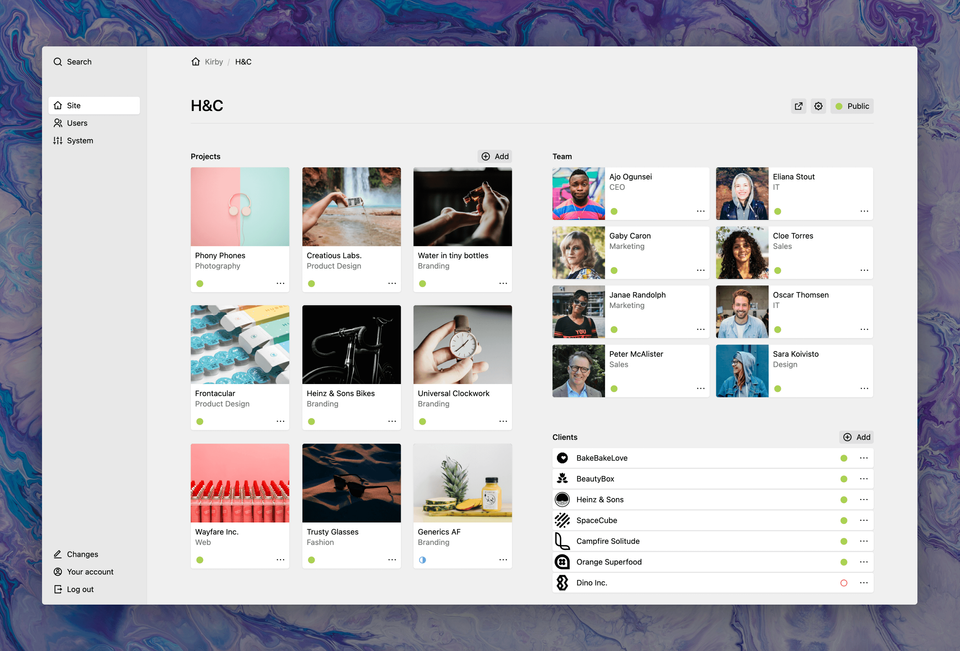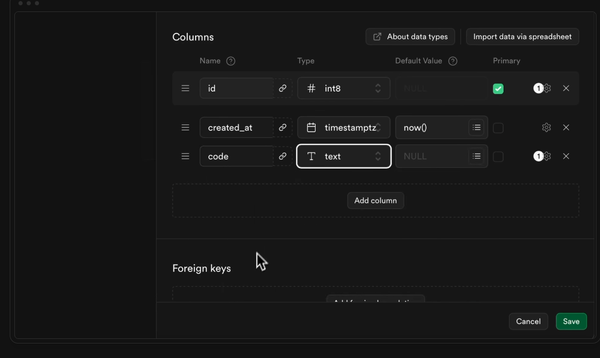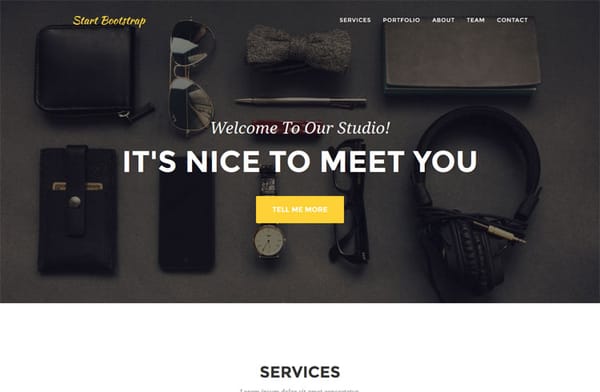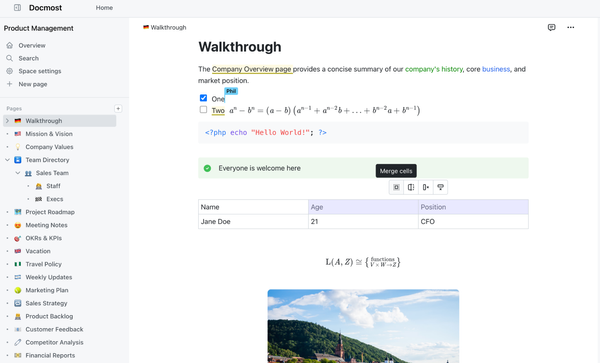17 Free Open-Source Flat-File CMS in PHP (Laravel, Symphony, and Pure PHP)
Table of Content
What is a Flat-file CMS?
Flat-file content management systems (CMSs) expertly address the issue of eliminating the need for a database to store content and configuration. Relying exclusively on flat-files instead of a database, they robustly safeguard against SQL-injection. Moreover, they optimally utilize server resources, far more efficiently than their traditional database-dependent CMS counterparts.
Indeed, backing up these apps is a breeze. You just have to duplicate the content and configuration files and tuck them away securely.
However, it's crucial to understand that the pristine condition of our servers isn't always guaranteed. Misconfigurations or improper setups could introduce security vulnerabilities.
These potential risks can impact our apps, opening the door to hacking, data loss, and leaks. But with vigilance and correct practices, these risks can be managed effectively.
Looking for a WordPress alternative or a free Wiki?
If you are looking for WordPress alternatives, you may check our article here: 20 Best Free PHP-based CMS Alternatives to WordPress.
Many wiki engines primarily use flat-file storage for pages, revisions, settings, and files. You can view the top flat-file based wiki engine in our collection here.
In this post, we offer you the best open-source flat-file CMS that is built using PHP.
1. Grav
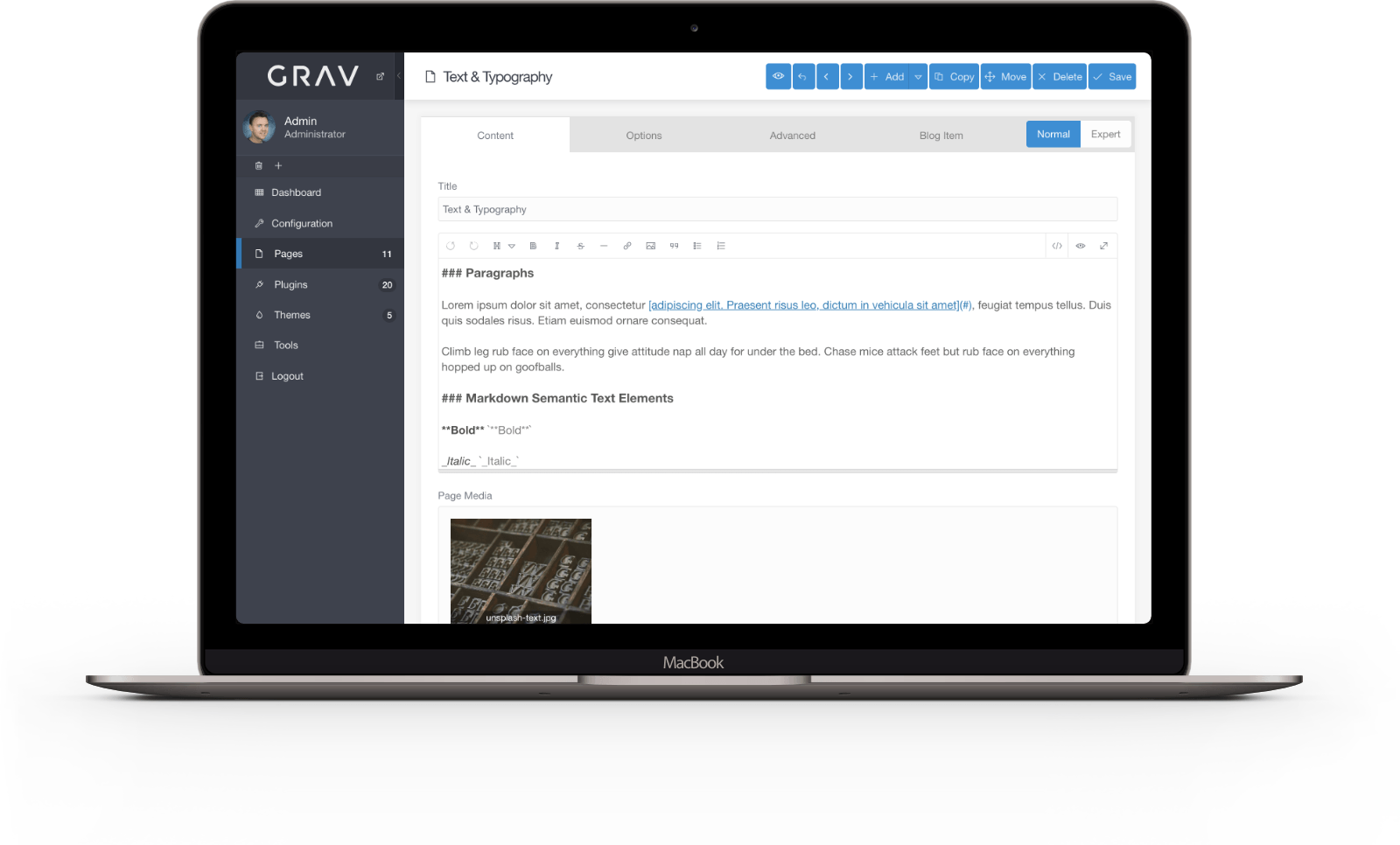
Grav is considered to be equivalent to WordPress but without database. It follows similar concept in dashboard design, admin panel, and has a vast ecosystem of themes and plugins.
Key Features
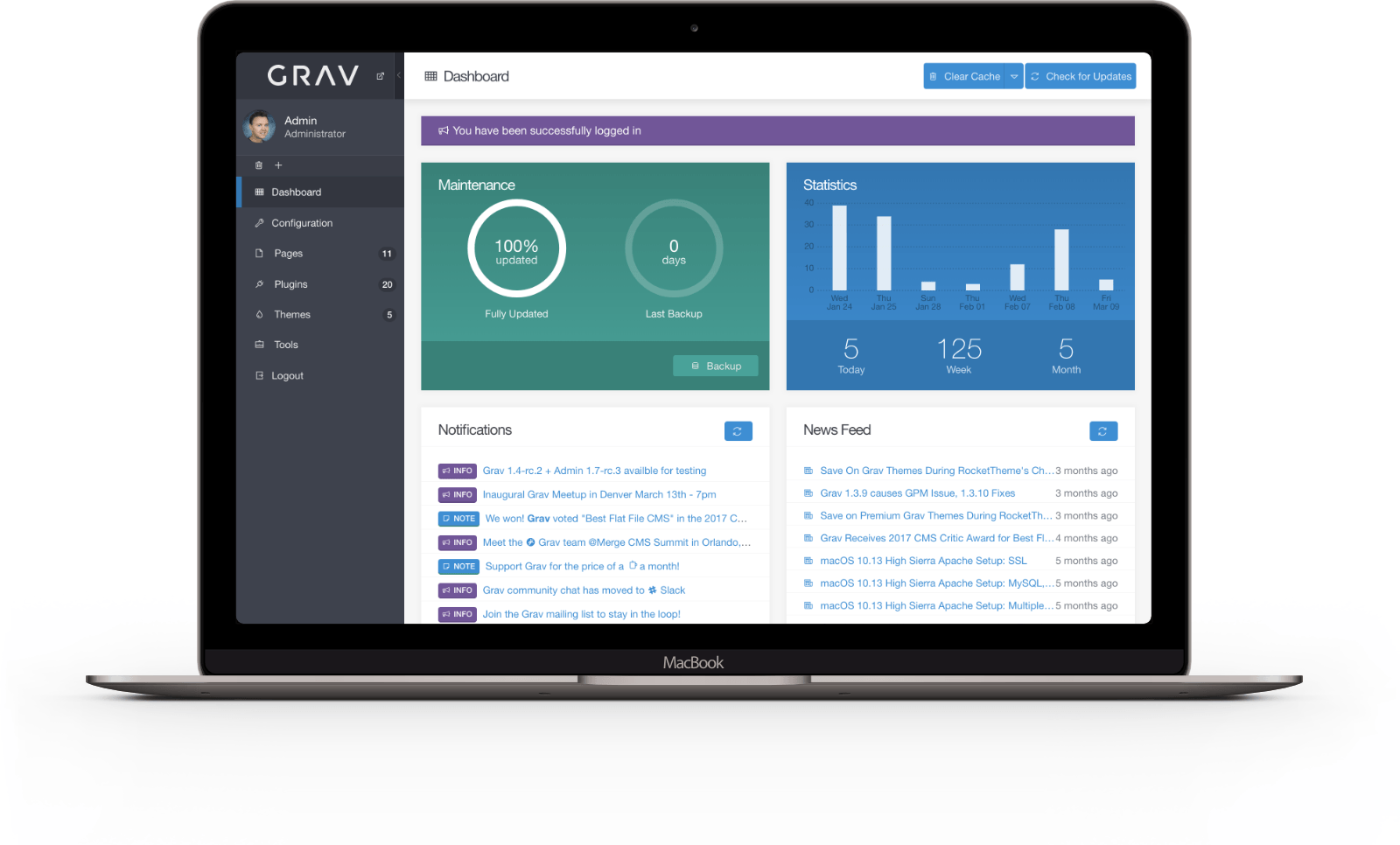
- Simple, intuitive interface with optional extensible Admin Panel
- Packed with amazing features and tools, including Command Line Interface (CLI) Tools, Asset Manager, and Advanced Forms
- Detailed documentation and extensive plugins available
- Enjoyable content creation with Markdown or HTML support
- One-click installs and updates with built-in Package Manager
- Stellar performance with smart caching and minimal requirements
- Powerful content filtering with flexible taxonomies and custom fields for dynamic content types
- Multi-language support and multi-site capabilities
- Simple backups and restores, with version control and sync support
- Image media processing including automatic page image handling and native Retina/HiDPI image support
- Easy theme customization with Theme Inheritance, no design restrictions in theming, and support for any CSS framework
- SEO friendly with routing and redirection
- User and role management, with meaningful statistics
- Debugging and logging
- Extensive use of best-in-class technologies and powerful configuration overrides
- Modular pages with automatic page link handling
- Extensibility with plugin event hooks, extra Twig filters & functions, and simple plugin system
2. BoidCMS
BoidCMS is a free and open-source flat-file CMS that is originally created as a fork of WonderCMS. It is a lightweight minimal CMS, easy to install and run. Moreover, it comes with full media support, developer-friendly API, and plugin API.
BoidCMS is an open source software licensed under the MIT License.
Features
- One Step Install
- Free and Open Source
- Simple and Easy to Navigate Admin Panel
- Themes and Plugins Support
- Super Extensible
- CSRF Authentication
- Custom Admin URL
- Custom Page Permalink
- Custom Page Template
- Blog Option
- File Manager
- SEO Friendly
- Content Type
- GDPR Compliant
3. Automad
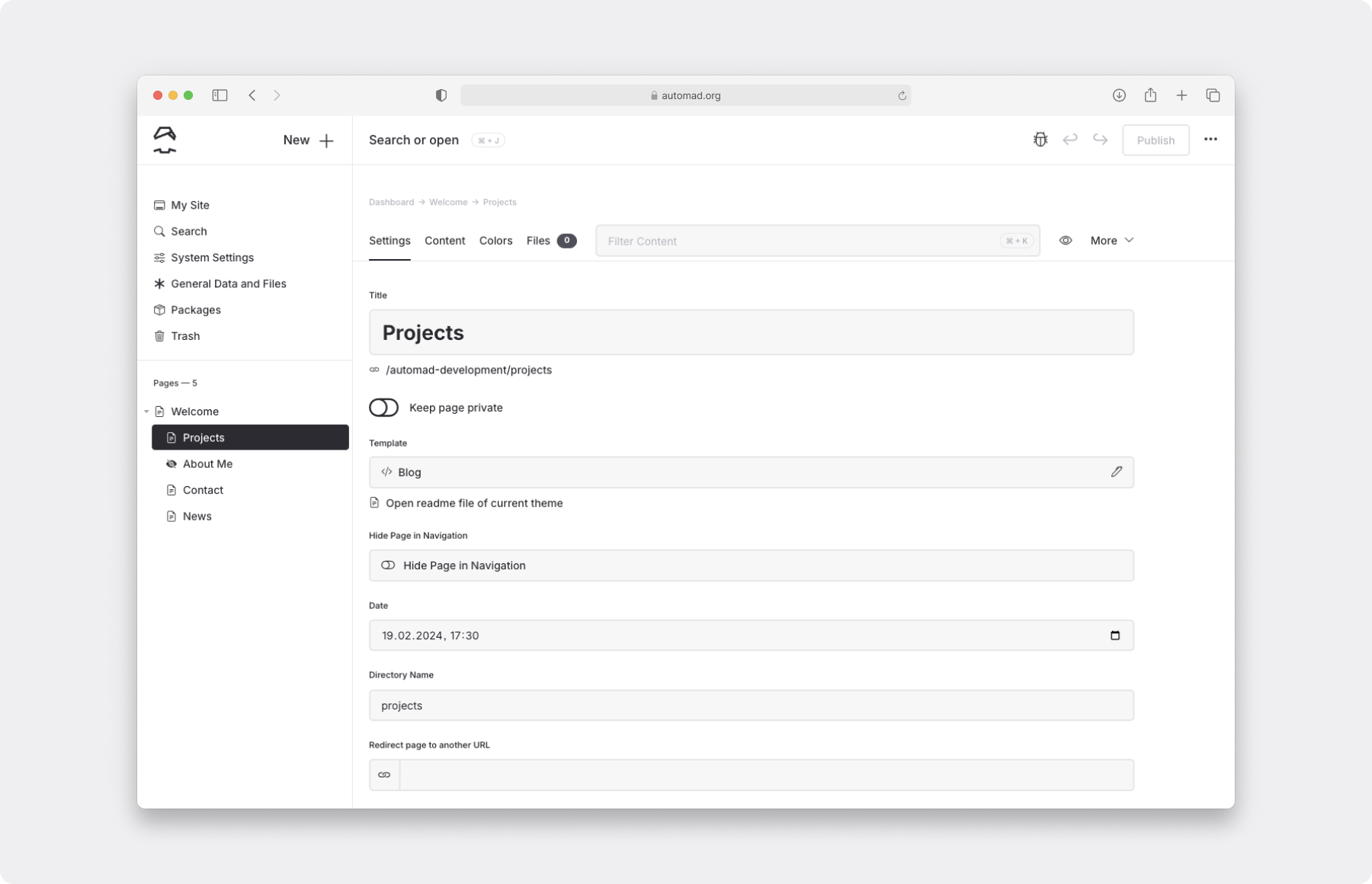
Automad is an amazing simple yet powerful Markdown-first CMS with minimal interface and rich feature set. It also features a powerful headless mode that turns your Markdown into dynamic REST API with one click.
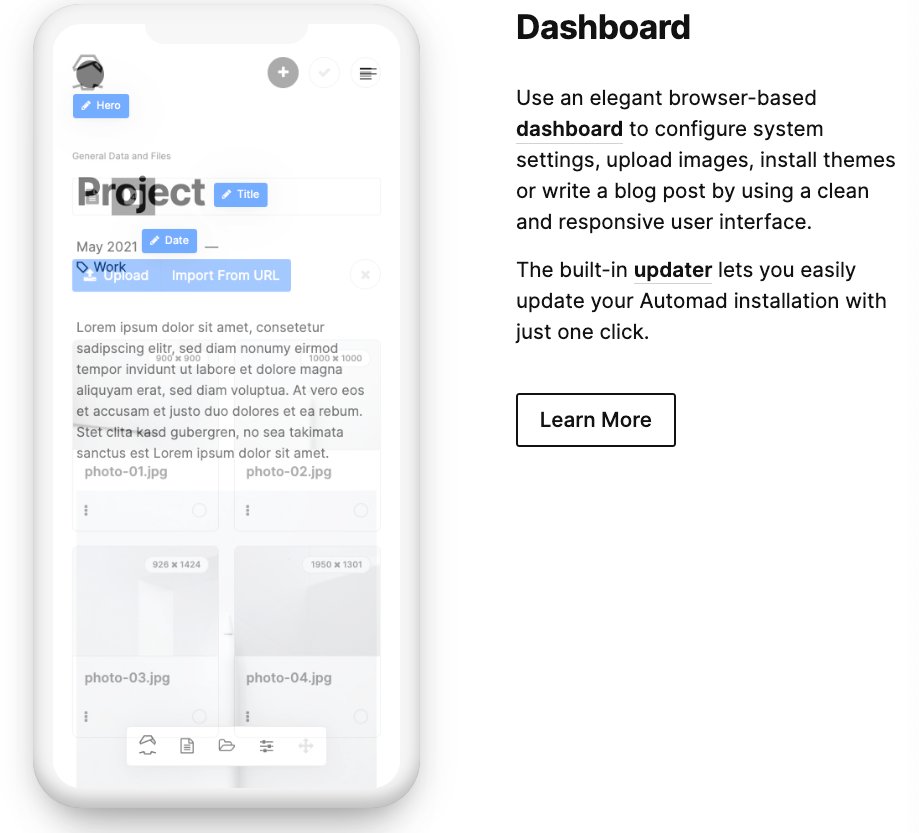
It supports search, post/ page tagging, comes with a strong caching mechanism, and a developer-friendly template engine that aids developers in creating fancy themes.
The dashboard is not just responsive, it supports mobile screens even when editing large posts.
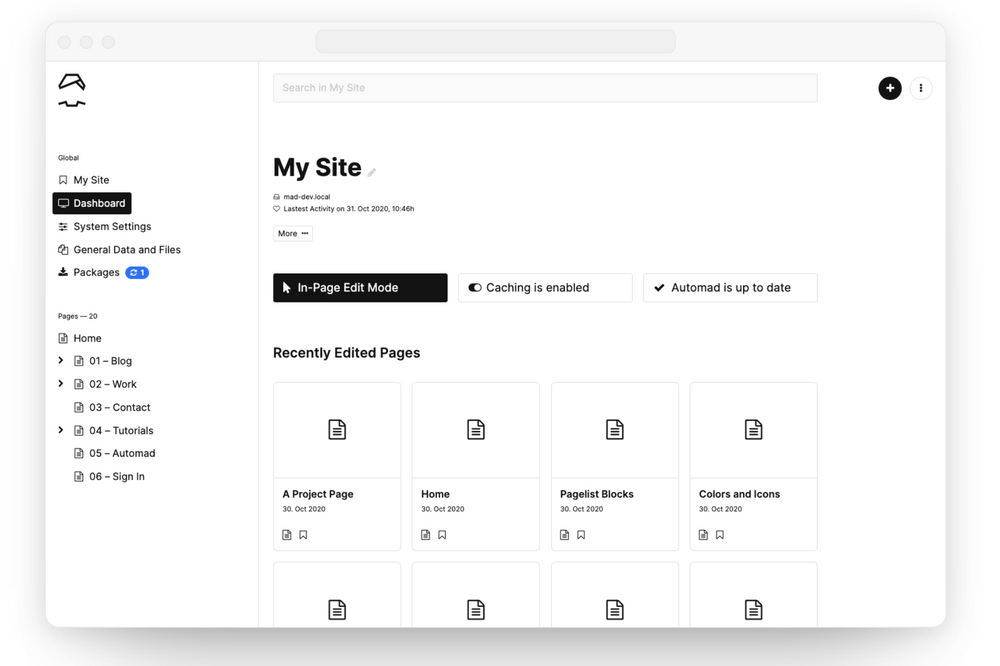
Personally, I used Automad in several clients, and it proven to be reliable, fast and easy to install and manage.
You can easily install and run it using Docker with the following command:
docker run -dp 80:80 -v ./app:/app --name mysite automad/automad:v2Do not forget to replace mysite with your site name.

4. Aloia CMS
Aloia CMS stands as the quintessential API-first Content Management System (CMS) that effortlessly blends user-friendliness with developer flexibility.
Built upon the robust Laravel framework, Aloia CMS empowers developers to manage website content with flat files, eliminating the need for a database. It's the go-to choice for small-scale websites and projects, guaranteeing an effortless development experience.
If you are looking to have a user-friendly GUI for Aloia, the core developers build a custom GUI for you here.
5. Saaze
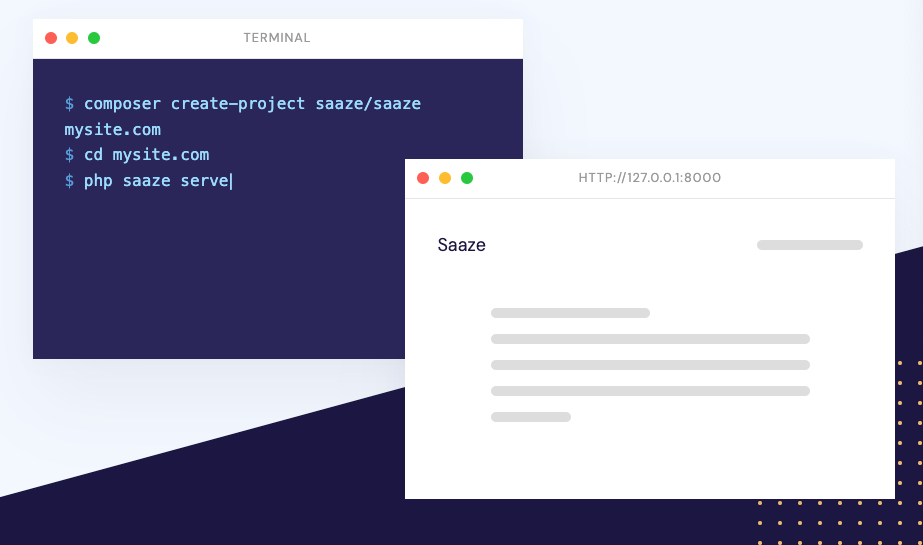
Saaze stands as an all-encompassing, flat-file Content Management System (CMS) meticulously designed for the effortless handling of simple websites and blogs. It boldly offers a more streamlined alternative to its more convoluted counterparts such as WordPress and Statamic.
The core mission of Saaze is to successfully eliminate the bloat and maintenance issues commonly linked with larger, more complicated CMS platforms, while simultaneously avoiding the daunting learning curve associated with static site builders.
Saaze asserts that creating a personal website or blog should not be a complex endeavor, but rather a straightforward one. Crafted with an intuitive design, it provides an unparalleled platform that effortlessly meets the needs of both novice and seasoned users alike, ensuring a smooth and efficient website building and managing experience.
Why Saaze is recommended?
- Easy to run: Saaze only requires PHP and Composer, two widely-used and easily accessible technologies. This makes launching and maintaining your site a breeze.
- Easy to host: Saaze can serve content in both dynamic and static formats, providing flexibility depending on your hosting needs.
- Easy to edit: Content can be edited using simple Markdown files, a popular lightweight markup language that's easy to learn and use.
- Easy to theme: Templates in Saaze use Blade, a robust and easy-to-understand templating engine. They can also optionally use PHP for greater customization.
- Fast and secure: Saaze does not require a database, which means fewer components to manage, increased speed, and less vulnerability to security threats.
- Simple to understand: Everything in Saaze is structured as a collection of entries, making it easy to understand and navigate.
- All-inclusive: Saaze includes a Command Line Interface (CLI) for easy site serving and building, providing a comprehensive toolkit for managing your site.
6. WonderCMS
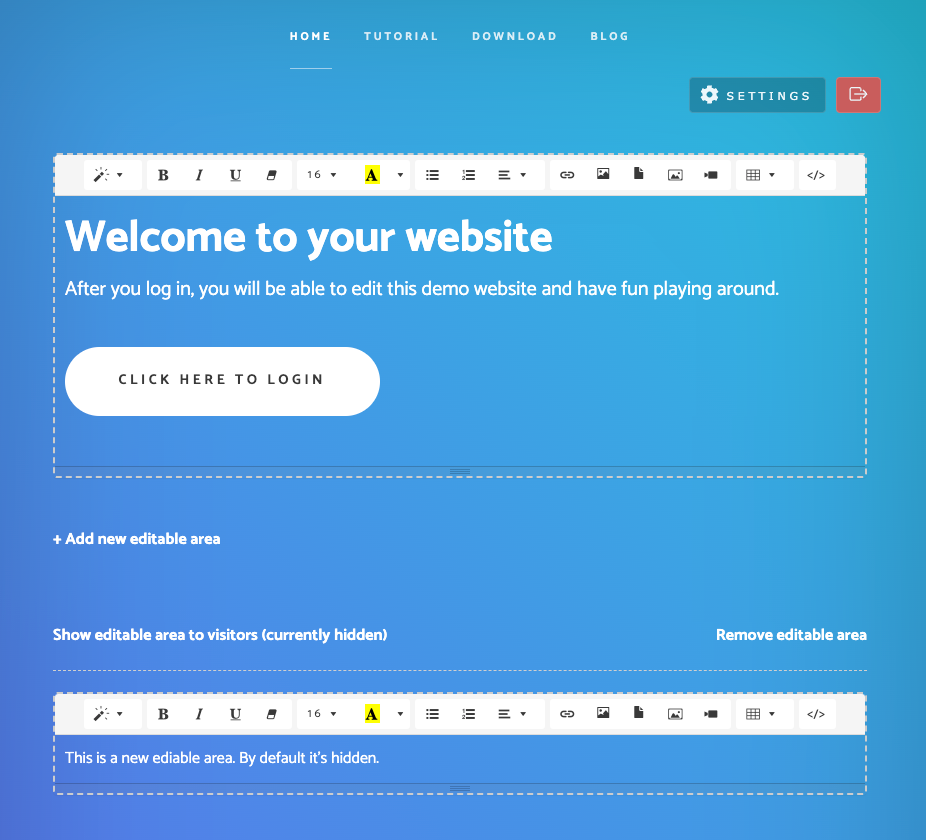
WonderCMS, a free and open-source website builder, stands out due to its lightweight nature and remarkable speed.
It's designed with simplicity in mind and does not require a database, making it an anomaly in the world of website builders. It offers a user-friendly interface that even beginners can easily navigate. This makes it an excellent choice for individuals or small businesses who are in need of a basic, yet effective website.
Unlike larger CMS platforms that may intimidate with their complexity, WonderCMS focuses on providing a straightforward and efficient website creation process. Whether you're looking to create a blog, a personal website, or an online presence for your business, WonderCMS allows you to do so with ease and efficiency.
Features
- WonderCMS supports HTTPS out of the box.
- All CSS and JS libraries include Subresource Integrity (SRI) tags. This prevents any unauthorized changes to the libraries being loaded.
- WonderCMS encourages you to pick a good custom login URL (in Settings -> Security), as it prevents brute force attacks. Search engines don't index/find your login URL as it always returns a 404 status.
- The admin password is hashed using PHP's password_hash and password_verify functions.
- WonderCMS includes CSRF verification tokens + hash_equals function to prevent timing attacks.
- Your website is completely independent and detached from WonderCMS servers.
- GDPR compliant - WonderCMS uses only 1 session state cookie, which defines a state between a logged in/logged out user.
- Last 5 logged in IPs saved.
- Admin is logged out of all devices after password is changed.
- no setup - unzip and upload
- extremely fast
- blog mode
- unlimited subpages
- 1 click updates
- custom theme/template for each page
- open source & free
- clean/friendly URLs
- developed since 2008
- no "powered by" links
- simple skeleton for a web app/website
- file manager
- theme/plugin installer
- easy to theme (8 steps)
- responsive
- simple to customize
- highlighted current page in menu
- lightweight - runs on 5 files
- simple page deleting/creating
- custom login URL
- custom homepage
- optional - functions.php automatically includes itself when created in any theme folder
- SEO - custom title, keywords and description for each page
- works by default on Apache (NGINX or IIS or Caddy require editing one server file)
- custom 404 page
- last 5 "logged in from" IPs
- log out of all devices after changing password
- easy click and edit functionality
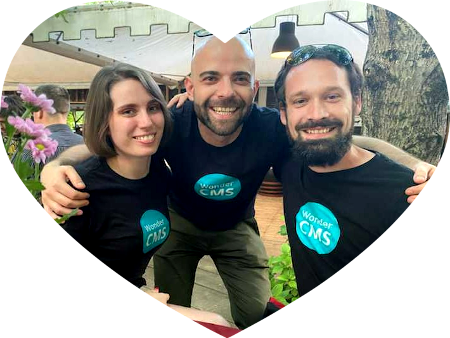
7. Blip
Blip is a simple, flat-file blog engine that doesn't require a database.
To use it, upload the "blog" folder to your website's root, update the SITEURL in the helper.php file, change the file.htaccess to .htaccess, and add blog posts to the "posts" folder as .txt files.
Customization can be done by copying your site's source into the HTML templates in src/Views/Layout.php, src/Views/Blog/Listing.php, and Post.php.
The code can be easily edited for additional features or changes. Potential issues may arise with .htaccess file settings depending on your Apache web server setup, and some adjustments may be needed for NGINX.
It has been tested on PHP 7.3+ and Apache Web Server.
8. Reboot CMS
Reboot CMS is a flat file, Markdown-based Content Management System (CMS) written in PHP, drawing inspiration from other systems such as Pico, Redaxo, and Craft CMS.
Reboot CMS stands out because of its minimalistic approach to content management. It is designed to be lightweight, foregoing the need for a database. Despite its simplicity, one of its key features is the support of Blocks, allowing users to build and manage their web content with ease and efficiency.
9. Pico
Pico is a cool, fast, and straightforward flat file content management system (CMS), ingeniously designed to revolutionize website creation and maintenance.
Standing out from traditional CMSs, Pico confidently discards the need for a database, instead harnessing the power of simple text files for enhanced speed and efficiency.
Touting support for the renowned Markdown formatting, Pico empowers users to write in an easy-to-read, easy-to-write plain text format that seamlessly converts into structurally valid HTML.
Embracing the advanced Twig templating engine, a nimble, rapid, and secure template engine for PHP, Pico proves itself as a robust and straightforward choice for developers demanding excellence.

10. REDAXO
REDAXO is a powerful website framework that effortlessly enables custom content creation with complete command over input and output. Its multilingual capabilities, extreme extensibility, and flexibility to adapt to your workflow make it a standout choice.
While its primary user base hails from German-speaking countries, its reach spans across several languages, thanks to the relentless translation efforts by our dedicated community.
11. Craft CMS

Craft CMS is a free feature-rich CMS platform that supports the entire creative process, including content creation, strategy, design, development, and e-commerce.
It offers security, support plans, integration with marketing tools, and world-class localization. Craft's control panel is translated into 25 languages and can be extended with plugins.
It also provides an intuitive authoring experience and scales with your business. The platform is supported by a worldwide community of agencies and developers.
Key Features
- Feature-rich dashboard
- Comes with a rich field set that include several form fields, and data fields
- Supports custom fields
- Supports multiple authors and editors
- Bulk inline editor
- Live preview
- Supports complex content relations
- Comes with a strong developer-friendly templating engine (Twig)
- Supports multimedia files and remote asset management
- Supports multiple languages
- Advanced user management system
- Craft includes a built-in GraphQL API, and a fully-headless mode.
- Dozens of plugins to extend its core functionalities.
- Integrate well with many eCommerce websites.
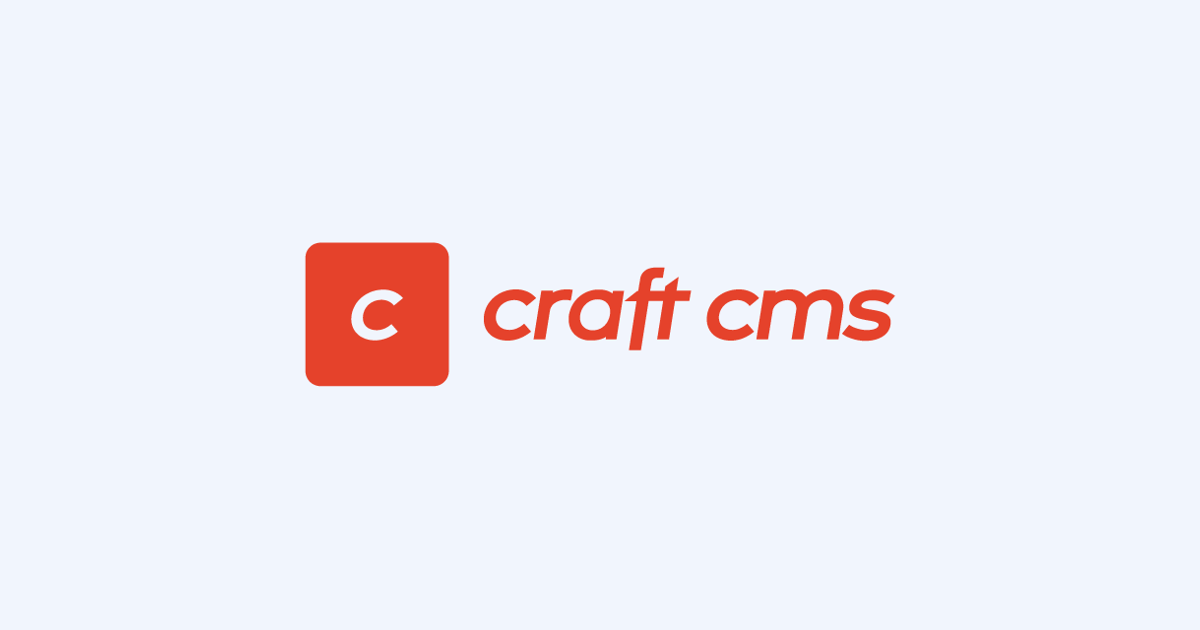
12. Herbie
Herbie stands out as a straightforward, up-to-date, speedy, and highly customizable flat-file Content Management System (CMS). Its strength lies in its reliance on PHP, Twig, Markdown, Textile, reStructuredText, and a variety of other human-readable text files. This combination allows for an unparalleled user experience in handling website content.
In more detail, Herbie's features are underpinned by a range of well-established libraries which ensure its durability and efficiency:
- For formatting page content, Herbie employs Markdown, reStructuredText, and Textile. These powerful tools allow for easy and efficient text formatting, resulting in clean, readable content.
- The Twig template engine is used for rendering layouts and extending the core. This ensures a high degree of flexibility, allowing users to create and modify layouts to their specific needs.
- For data structure files, Herbie utilizes Yaml and JSON. These languages are well-known for their usability and readability, making data management a breeze.
- Lastly, Composer and Packagist are used for Dependency and Plugin Management. This ensures a seamless and efficient management of system dependencies, as well as the easy integration and management of various plugins.
13. Flextype
Flextype is a modern, open-source, flat-file content management system (CMS) that places a strong emphasis on simplicity and control. One of the core principles behind its design is that it should be as simple as possible to use, without sacrificing the power and control that users need to create and manage their content effectively.
In contrast to many traditional CMS platforms, Flextype allows users to design their own data structure. This means that rather than being forced to fit your content into a predefined structure, you have the freedom to create a structure that suits your specific needs. This level of customization is rarely seen in other CMS platforms and adds a new layer of flexibility to content management.
Additionally, Flextype also enables users to easily share their data using version control. This feature not only promotes collaboration among team members but also ensures that all changes to the content are tracked and can be rolled back if necessary.
One of the standout features of Flextype is that it does not require a MySQL database. Instead, all of the data are stored in simple files. This approach not only simplifies the setup and maintenance of the CMS but also ensures easy portability. You can easily move your content from one server to another without the need to export or import a database.
Lastly, the use of simple files for data storage also simplifies the process of extending the CMS. Whether you need to add new features or integrate with other systems, you can do so with relative ease thanks to the simplicity of the file-based data structure.
14. Kirby
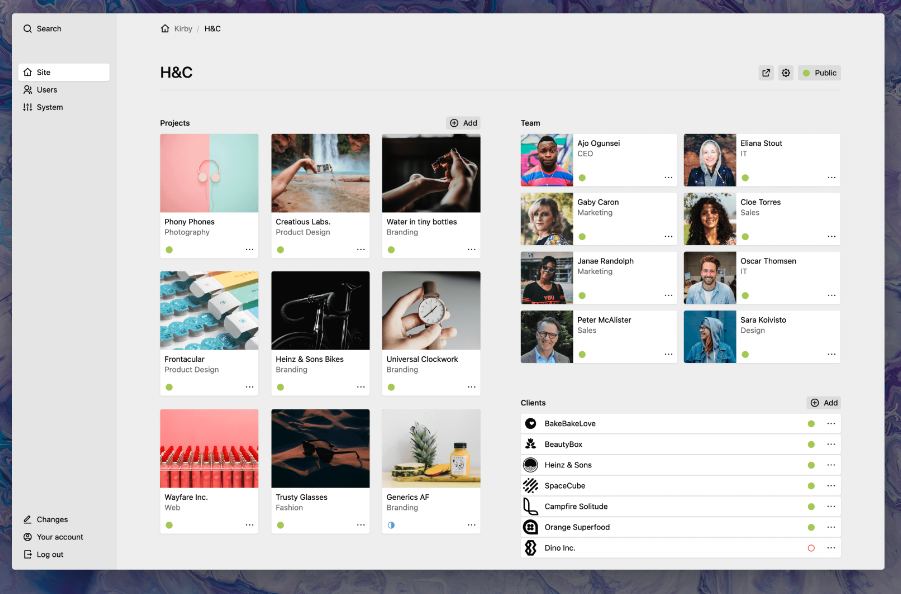
Kirby is a highly versatile and robust file-based content management system (CMS), known for its simplicity in both setup and usage. It offers an extensive range of functionalities that cater to a wide array of web development requirements. Kirby's standout feature is its lack of database requirement, making it an excellent choice for small to medium-sized projects where the overhead of maintaining a database could be unnecessary or burdensome.
One of Kirby's key attractions is its intuitive and user-friendly panel, which provides an efficient and streamlined interface for managing content. This feature allows for easy and hassle-free content management, thus enhancing productivity and efficiency.
Moreover, Kirby is designed with multilingual support, a critical feature in today's globalized digital landscape, where the ability to cater to different languages can significantly enhance a site's reach and usability.
Another key aspect of Kirby's functionality is its provision for developers to create custom fields. This feature enables greater adaptability and customization, allowing developers to tailor the CMS to specific project requirements and preferences.
Built with PHP, a popular and widely-used server-side scripting language, Kirby ensures compatibility and performance. Additionally, its functionality can be further expanded with plugins, extending its capabilities and making it an even more powerful tool in a developer's toolkit.
15. Statamic
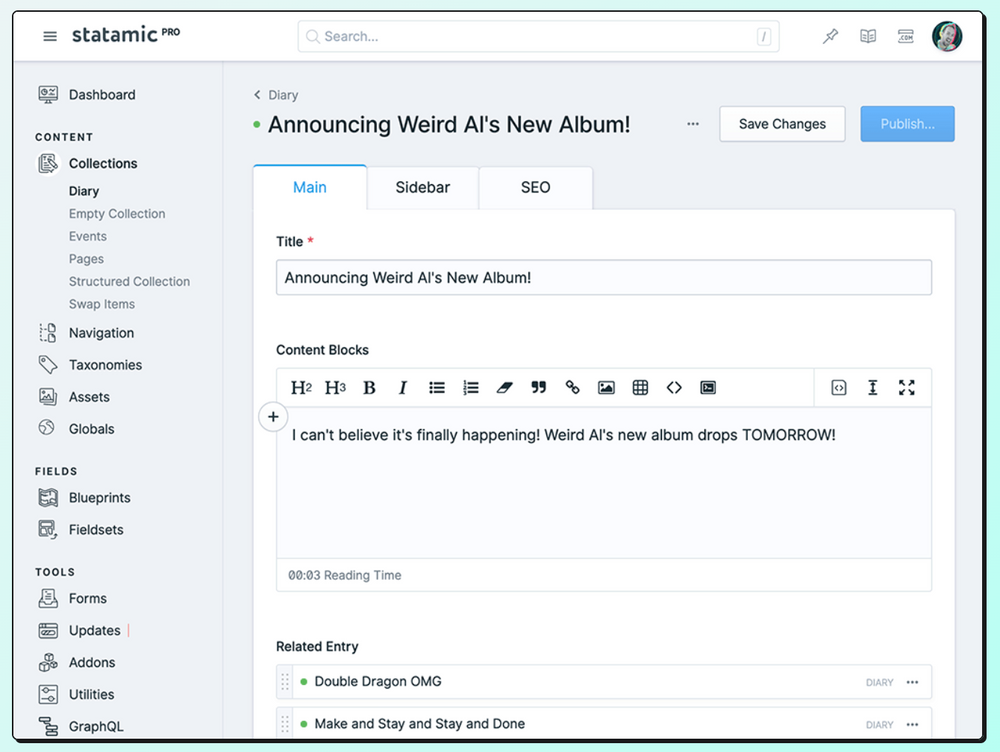
Statamic represents a revolutionary approach as a flat-first Content Management System (CMS). Seamlessly integrating with Laravel, a popular PHP framework, and Git, a widely-used version control system, Statamic is designed with the goal of constructing aesthetically pleasing websites that are also easy to manage.
This unique combination of technologies empowers developers by providing them with a robust and flexible platform to create and manage web content efficiently.
16. md-cms
md-cms is an outstandingly straightforward and efficient flat-file CMS, born out of a necessity for a more streamlined approach to managing legal pages. With its foundation in Markdown files and a lean PHP core, it delivers a seamless content creation and editing experience, eliminating the need for complex coding skills.
Standout features include dynamic Markdown file rendering via an HTML template for effortless layout creation, utility-first styling with tailwindcss for instinctive design, and lightweight interactivity via Alpine.js. This guarantees an immersive user experience devoid of coding complications.
Additionally, md-cms boasts a development server with auto-reload for immediate change visualization. The cherry on top is a Git-based auto-deployment feature via webhooks, completely doing away with manual updates, ensuring your content remains fresh and engaging for your site visitors.
17. Typemill
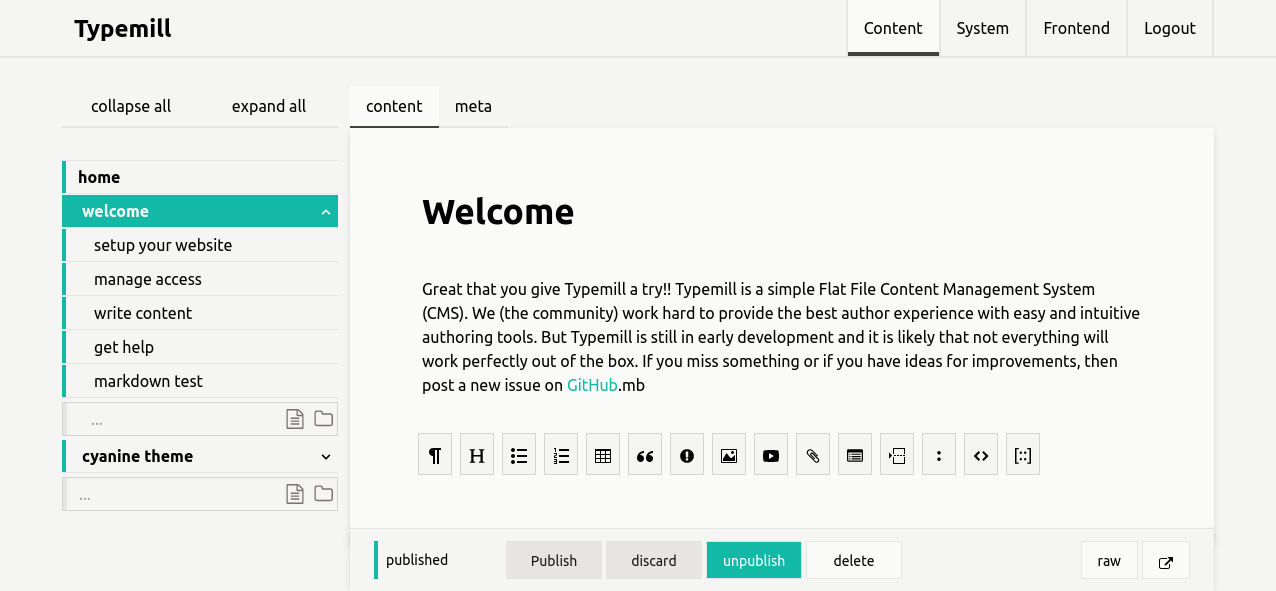
Typemill is a compact, flat-file Content Management System (CMS) uniquely engineered to provide a simple, fast, and flexible platform for creating websites and eBooks. Its core design leverages the simplicity of Markdown, a lightweight markup language that allows users to format their content easily.
The essence of Typemill lies in its ability to streamline the process of content creation, making it an excellent choice for those seeking to maximize efficiency and flexibility in their digital projects.
Features
- No database required (flat-file approach).
- High performance, with a modern tech stack including Vue.js, Tailwind CSS, and Slim PHP.
- Lightweight, with a gzip size of about 2MB.
- Markdown editing with a visual block editor or a raw markdown editor.
- Easy extendible with plugins, themes, and page-tabs.
- Generation of ebooks (pdf, epub) with an ebook-plugin.
- Flexible form-generation.
- API-architecture and headless mode.
Read more
- 13 Most Used Open-source Free Laravel CMS For Building Scalable Sites
- 40 Open-source Free Laravel Projects, CMS, ERP, Headless, CRM and More
- 37 Top and Popular Open-source Laravel Projects (CMS, Helpdesk, CRM, eCommerce, and Accounting)
- 20 Best Free PHP-based CMS Alternatives to WordPress for 2024

